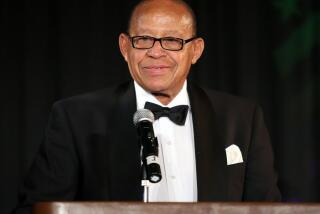Ken W. Clawson; Nixon’s Media Director
- Share via
Ken W. Clawson, the White House communications chief during the final months of the Nixon administration and a zealous loyalist to the embattled president before and after his 1974 resignation, has died.
Clawson, 63, died Friday in New Orleans after a heart attack.
A former reporter for the Washington Post, Clawson joined the Nixon administration as deputy director of communications in February 1972, less than five months before the break-in at Democratic National Committee headquarters in the Watergate complex that ultimately led to the president’s resignation. Over the next 30 months, he built a reputation as one of Nixon’s most aggressive defenders, even as the Nixon presidency disintegrated in the face of scandal.
At the end, “there were so few of us left who were still loyal to the old man. . . . Tears were streaming down my face as I watched the helicopter take off,” Clawson wrote in an article several years later for the Post, recalling the president’s departure from the White House lawn Aug. 9, 1974. Clawson later joined Nixon in San Clemente, where he remained on the former president’s staff for five months.
Savvy and well-connected in the Washington press corps, Clawson joined the White House staff with a mandate that he described as seeing to it that the administration’s position received adequate coverage in the media. Relations between the White House and the media had been testy at best, and Clawson’s marching orders were to counter what the administration perceived as an anti-Nixon bias.
Clawson was said to have cultivated a “tough guy” image in his role of White House defender. “I’m just one of Richard Nixon’s spear carriers and proud of it,” he told the New York Times.
According to Marilyn Berger, a Post reporter at the time, Clawson boasted to her in 1972 that he was the author of a letter that had damaged the candidacy of Sen. Edmund S. Muskie (D-Maine) in the New Hampshire presidential primary. The letter, addressed to the Manchester Union Leader newspaper, quoted Muskie as having used the racially disparaging reference “Canucks” in a letter to describe French Canadians.
Clawson later denied Berger’s recollection of the conversation, saying that she must have misunderstood him.
He was known to have telephoned Walter Cronkite in the middle of a “CBS Evening News” broadcast to demand that a White House comment on a particular story be aired before the program ended. Members of the White House press corps said he threatened to get them in trouble with their editors if they produced stories that he considered unfair to the president.
Clawson was born in Monroe, Mich., and graduated from Bowling Green State University in Ohio. His first job in journalism was with the Monroe Evening News. From there he went to the Toledo Blade, where he became national labor reporter.
In 1967, he won a Nieman Fellowship at Harvard University, with the support of letters of recommendation from James R. Hoffa of the International Brotherhood of Teamsters, Walter Reuther of the United Auto Workers, and management executives of General Motors.
Clawson joined the Post as an editor on the national desk after completing his Nieman year at Harvard, then he covered the Justice Department as a reporter.
In 1975, he suffered a partially paralyzing stroke from which he never completely recovered.
With his wife, Carol, he later moved to New Jersey and eventually to New Orleans.
More to Read
Get the L.A. Times Politics newsletter
Deeply reported insights into legislation, politics and policy from Sacramento, Washington and beyond. In your inbox twice per week.
You may occasionally receive promotional content from the Los Angeles Times.










